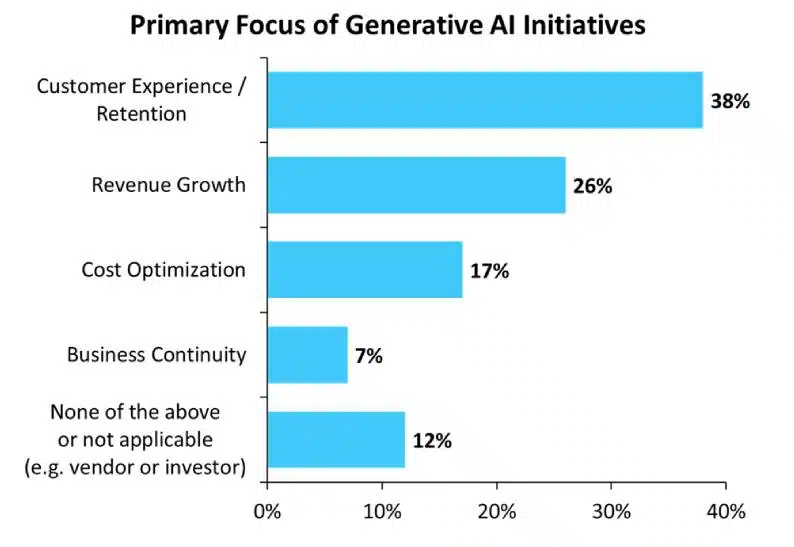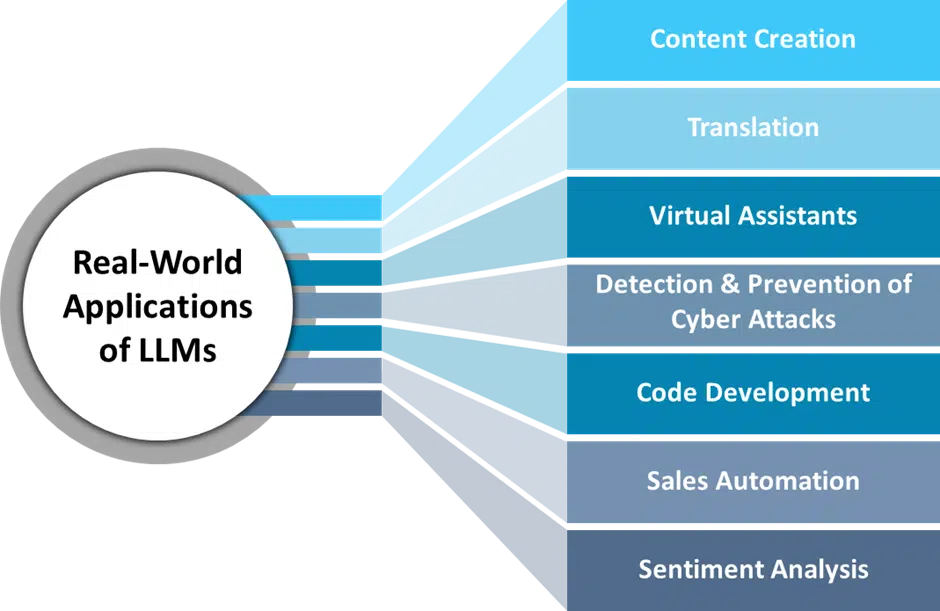Large Language Models also addressed as LLMs, are new in the realm of technology but have taken the world by storm. Today, when we talk about this relatively recent innovation, we do not hesitate to say that this technology has already significantly impacted various industries. Adept at making unactionable data actionable, in any situation if you need to get insights from a dataset, Large Language Models have a role to play. However, with its growing popularity and potential more and more businesses are leveraging LLMs, to improve productivity, optimize business operations, and gain a competitive edge in the market. LLMs have been around since 2012. With each new version, they are becoming better, and more efficient at their tasks and faster at language processing. Starting with 2022, LLMs are becoming more robust and reliable.
Talking numbers, the global LLM market is forecasted to rise from $1,590 million in 2023 to $259,8 million by 2030. During this period the Compound Annual Growth Rate (CAGR) is expected to be at 79.80%, according to a report by Pragma Market Research. Well, these numbers are huge and reflect the kind of potential LLMs can bring to the market. LLMs are powerful tools deployed to understand and analyze textual data. Additionally, they can also be used extensively to understand and explore numeric data.
Unlike before, with recent advancements and innovations, the scope of what LLMs can do has expanded and now they can be multimodal. This literally means, that now LLMs are not just limited to generating text, but can also give outputs like images, sounds, videos, and more. In this blog, we plan to go a step ahead and share insights on various applications of this mind-boggling technology in the business world.
So, stay tuned!
In simple terms, Large Language Models, or LLMs are advanced machine learning models engineered to understand and generate human language. They operate by exploring and analyzing large datasets of language, that can predict and produce consistent sentences and even paragraphs. Also, if we focus on the word “Large” it not just represents the size of the data sets but also its ability to scale and the complexity of the model.
Delving deeper, LLMs are a category of foundation models that are trained on large amounts of data to deliver foundational capabilities to drive multiple use cases and applications and resolve a range of tasks. More interestingly, LLMs lead to a notable innovation in the realm of NLP and AI. LLMs are at the heart of popular tools like the ChatGPT series, making sophisticated language processing accessible to a broad audience.
LLMs are becoming visible and extremely popular, because of the role they have played in bringing Generative AI into the spotlight. The image below contains statistics shared by Gartner on the impact of Gen AI on various aspects of the business.

Other than leveraging the goodness of Gen AI, there are several compelling reasons why businesses should think about deploying LLMs.
You can also read our blog on Gen AI in customer service to explore implementation and top use cases.

LLMs have a significant impact on the business landscape, enabling businesses to realize innovative applications that can generate new revenue streams. Let us now explore the real-world applications of LLMs:
LLMs are experts at generating high-quality content across a variety of formats such as articles, blog posts, sales pitches, social media, and so on, saving resources a large amount of time. They are also often used for editing and proofreading purposes. As writing assistants, they are adept at giving real-time suggestions on aspects like grammar, style enhancements, and alternative phrasing.
Additionally, these language models also help in the creation of content ideas and wireframes that work as a building block for creating a seamless experience. By analyzing large amounts of data, this booming technology ensures that the content is customized. As businesses are rapidly embracing the digital landscape, LLMs stand as an unparalleled tool to drive engagement, foster brand resonance, and gain a competitive edge via content that is both appropriate and resonant.
LLMs play a vital role in translation and localization. They are set to break language barriers and can be a game changer for businesses looking to expand their geographical boundaries. By leveraging advanced LLMs, businesses can make international operations a lot smoother. It also gives businesses the upper hand in collaborating more effectively with the global audience.
The evolution of LLMs in this segment can be used for seamless text translation while preserving the colloquial context and nuances. This makes them an indispensable tool. Not just this but these models also contribute to cultural aspects, ensuring the translated content relates to the local audience and balances cultural sensitivity.
Hi, how can I help you? Well, when you come across something like this, it makes it so much easier to get answers to your questions or queries. So, don’t be surprised to know that chatbots, or what we also call virtual assistants powered by LLMs can be extremely beneficial for businesses. Designed to deliver fast and efficient customer services, handle routine inquiries, and manage tasks that don’t demand human attention, help businesses save a lot of man hours and money.
However, the integration of such intelligent virtual assistants into business operations offers numerous benefits, including improved customer satisfaction through quick and accurate responses, as well as better resource allocation by allowing employees to concentrate on higher-value tasks.
Large Language Models are extensively trained on datasets, making them a powerful tool to detect and prevent cyberattacks. These models can process large datasets collected from across the enterprise network and detect unusual patterns that alarm malicious activity. Cybersecurity vendors are also actively exploring this arena to fortify threat detection. By using their potential to analyze and correlate information in real-time, LLMs can more efficiently detect and flag potential threats, preparing organizations to respond proactively and mitigate risks before they escalate into major security incidents.
Cyberattacks’ growing sophistication and perfection have gotten cybersecurity companies to actively explore and integrate LLMs into their threat detection and prevention strategies. This intervention strengthens their ability to adapt to new attack vectors, recognize evolving tactics used by cybercriminals, and provide more robust protection for businesses. As a result, deploying LLMs in cybersecurity not only bolsters an organization’s defense mechanisms but also reduces the likelihood of costly breaches and downtime, ensuring a more secure digital environment.
Another fascinating area where LLMs are making a significant impact is in code development and programming. One of the toughest challenges in software development is ensuring code quality and efficiency, and LLMs are proving to be invaluable in making this process better. This is the next step in LLMs where these tools are trained to go beyond natural language generation to encompass code development in computer languages such as JavaScript, Python, PHP, and C#. This expansion allows individuals with limited technical expertise to initiate code generation. The ability of language models in code generation supports the production of basic code generation. Even though these models are great at handling simple projects and resolving basic challenges, these models can feel overwhelmed when confronted with complex tasks. However, even if these models encourage initial code generation, it is advisable to exercise due diligence. A thorough evaluation of the machine-generated code is extremely crucial to ensure functionality and security, avoiding any potential disruptions post-deployment. Furthermore, these AI tools extend their utility beyond the initial coding phases and aid in debugging existing code bases, offering insights that streamline troubleshooting.
Sales and marketing are like the flesh and blood of any business. Having these two departments operate at their best potential can catapult businesses toward the road to success. Sales and marketing automation is the process that uses digital technology to speed up, customize, and optimize activities leading to better lead generation and higher closure of deals. But for this, automation is not enough. You need intelligence, insights, and personalization. This is where LLMs act.
LLMS undoubtedly takes sales and marketing automation to the next level by blending these processes with advanced intelligence and deep personalization. After analyzing large amounts of data, they are adept at discovering nuanced insights related to customer behavior, buyer patterns, and trends, allowing sales and marketing teams to develop highly targeted campaigns that can connect on an individual level. With LLMs, businesses can generate personalized content in minutes and impact customer journeys in real time. This not only adds to the customer engagement quotient but also remarkably elevates the efficiency and effectiveness of both sales and marketing efforts driving better sales, customer loyalty, and brand presence.
LLMs are taking over sentiment analysis by providing businesses with a deep and real-time understanding of what we call public sentiment around their products, services, and industry trends. By deeply analyzing customer reviews, social media reactions, and even answers shared on online forums, a business can understand a lot about how their customers or the audience in general feel. This is where LLMs can extract valuable insights out of customer opinions and sentiments, allowing businesses to tailor their marketing strategies to stay aligned with customer sentiments.
This is a great way to strengthen brand value. Also, with the ability to detect subtle shifts in public sentiment, companies can quickly respond to emerging trends and customer preferences, ensuring that their strategies remain relevant and effective.
It is very significant to embrace LLMs in business responsibly. Businesses are aspirational. Every business is started with the dream of making it bigger and bigger with each passing day. But no matter what strategies you plan to implement to support your business to reach the heights of success, it is essential to deploy anything you choose responsibly.
Similarly, while leveraging the goodness of LLMs for your business, make sure to use them responsibly. While the potential modern AI, LLMs bring to the table is high. Therefore, to harness the true value of this potent technology, businesses must use them responsibly, considering, challenges and ethical considerations:
Some of the specific hurdles include:
LLMs are not just catchphrases. They show immense potential in refining and improving different business operations to get better results. The value that LLMs bring to businesses is undeniable. Adept at automating routine tasks and sharing invaluable insights, they can speed up informed decision-making and offer businesses a competitive edge.
By integrating LLMs into their workflows, companies can achieve greater efficiency, more personalized customer interactions, and faster, more informed decision-making. The value that LLMs bring is not just in improving current practices but in opening new avenues for innovation and growth. As businesses continue to explore and adopt this technology, those who embrace it responsibly and strategically will find themselves better positioned for long-term success.
Calsoft being one of the early adopters of Gen AI, we work towards adding value to the business process and helping our clients get a competitive edge. Calsoft helps customers solve their biggest business
challenges. Our expertise lies in big data, traditional analytics, and gen AI, focusing on enterprises and ISVs.